#vegan diet help diabetes
Text
Vegan Diet for Diabetes Management: 5 Superfoods to Add to Your List

We all know how following a proper vegetarian diet is the key to keeping your blood sugar stable. Fluctuating blood sugar can give rise to various unwanted health problems. So, if you’re diabetic, you must supplement your regular meals with plant-based food. Instead of meat, you should focus more on the consumption of fiber-rich veggies and fruits. Keep reading to discover which are the 5 low-carb superfoods you need to include in your vegan diet. Connect with a reliable diabetes ayurvedic cure online retail shop to find out what type of vegetarian diet for diabetes you should go for.
Spinach
Leafy greens that are rich in healthy fibers not only fill your tummy but also assist in restricting changes in your blood sugar levels. Did you know that the glycemic index of spinach is 15? Also, the low-calorie content in spinach makes it a suitable option to manage your weight, which is essential for diabetes management.
Sweet potato
Being full of carbohydrates, potatoes are a no-no for diabetic patients. But you can always opt for pink sweet potatoes or shakarkandi that are packed with good carbs that do not metabolise quickly and maintain steady sugar levels. Having glycemic index that’s less than 55, sweet potatoes are a tasty and healthy food to include in your meals in moderate proportion.
Bitter gourd
Not that fond of the bitter taste of this vegetable? Well, keeping that aside, there’s no doubt that bitter gourd is a must-have vegetable in a good diabetes diet. The anti-diabetic properties as well as insulin-resembling compounds present in karela make it the healthiest superfood for improving your system’s insulin activity.
Orange
As per the American Diabetes Association, citrus fruits have been found to be exceptionally effective in managing blood sugar levels. Oranges have large amounts of fibers too. These fibers inside this delicious fruit don’t breakdown quickly and stay in your body for a long period, incorporating eventual release of sugar. Have whole orange instead of orange juice as the former is richer in fiber content.
Chia seeds
Full of antioxidants and packed with anti-inflammatory properties, these super seeds contain loads of fiber, iron, zinc, calcium and magnesium. Chia seeds are a fantastic choice for diabetics to regulate blood sugar and prevent diabetes-related illnesses. You can soak them in water or sprinkle them over your cereals, salads or smoothies to enjoy a wholesome plant-based diet.
Visit a high-starred ayurvedic cure for diabetes e-store to find out about a standard healthy vegan diet for diabetes so that you can follow it judiciously.
#Vegan Diet for Diabetes Management#what vegan foods are good for diabetics#vegan diet for diabetes cure#how does a vegan diet affect diabetes#vegan diet for diabetes and weight loss#veg diet plan for diabetic patient#veg diet for diabetes patients#vegetarian diet for diabetic patients#vegan diet plan for type 2 diabetes#best vegan diet for type 2 diabetes#is a vegan diet good for diabetics#vegan diet good for diabetes#vegan diet help diabetes#is vegan diet healthy for diabetics#vegetarian food for diabetic patients in india
0 notes
Note
I went diabetic earlier this year, since then I've had far more serious health concerns to really focus on it. I've listened to my primary care and reduced my average a1c from 13 to 7. I've recently been looking into diets and what not that are the best. Currently, I'm trying to cut out all carbs, on my doctor's orders. What I'm seeing though is that a plant based diet is best. It looks like a ketogenic diet is what my doctor wants me to follow? I've watched videos on both diets and I don't know, I agree with you that keto is evil. What are your thoughts about this?
I am not a medical professional so i can't give you medical advice, but I'd say that you should ask your doctor for a referral to a dietician (an RD or an RDN, NOT a "nutritionist" - RD/RDN are protected terms that mean they have completed specific training and have specific board certification) and ask the dietician for advice on your specific dietary needs for your specific medical conditions.
What I can say is that trying to cut all carbs is pretty dangerous - not only is it a macronutrient that our body uses as the most available fuel for your body processes (we *can* get fuel from protein and fat, and ketones can *theoretically* replace sugars for energy but nobody is actually sure how long our bodies can do that and we know it's a LOT less efficient, it's supposed to be less efficient, and what that means is it makes a lot of people feel exhausted when they try it because they literally have less available energy) but also there are certain nutrients that are fortified in the US that are going to be hard to get if you're cutting carbs completely. The example that I always use is folate, because when I had to cut wheat out of my diet (i have grain allergies and celiac disease) I didn't know to supplement it and ended up with a form of anemia and stuff like "fainting" and "dizziness" and "low oxygen saturation."
Which is part of why massive diet changes should be undertaken with the assistance of a dietician! That's why I started studying nutrition! Because nobody supervised my medically necessary diet changes and it went very poorly!
Your GP very likely doesn't have a ton of training on nutrition, and is even less likely to have training on nutrition specific to your condition. If your GP is telling you to cut all carbs, they are telling you to do something dangerous and not nutritionally sound (even really restrictive keto diets call for 20g of carbs a day). Ask either them or your endocrinologist for a referral to a dietician (again, you are looking for a Registered Dietician or a Registered Dietician Nutritionist, RD or RDN, NOT just 'nutritionist') who is familiar with helping diabetics manage their nutrition.
Now, all of that said, in the choice between two fairly restrictive diets I will always say to try the one that requires less effort. It is much easier to eat a plant-based diet long term than a keto diet, and it is vanishingly unlikely that you are going to end up protein deficient (the primary concern for most people who are starting plant based diets, and it's just not all that likely - we need a lot less protein than a lot of people seem to think; though if you're going completely vegan you do need to be careful to supplement your B vitamins and to ensure that you're getting plenty of omega fats)
Because the thing is, for a diet to "work" you have to be on that diet forever. If you stop being on that diet, and stop adhering to its restrictions, whatever benefits exist for that diet go away. So the best diet for *anybody* is one that will provide them with the nutrients they need in a way that they can access regularly and affordably, that they enjoy eating and can comfortably maintain for long periods of time, and that includes a variety of fruits and vegetables because the only diet advice that is nearly universally applicable is that people should be eating more fruits and vegetables and they should be eating a wider variety of them.
I am not a fan of "diets" as a concept and I think that people should think of nutrition in terms of "my diet" not "the diet that is meant to be one-size-fits-all for millions of people that I am attempting." Your diet is what you eat and drink, and that is what you should be looking at adjusting. If you want to reduce carbs in your diet it's better to tweak your consumption than it is totally replace your diet with a one size fits all keto diet. If you want to increase fat in your diet it is better to tweak your consumption than it is to replace your diet with a one size fits all atkins diet. If you want to go plant based I think it is better to start by adjusting your diet to include more plants and to slowly replace animal based products than by trying a one size fits all vegan diet right out of the gate. You can always (and should!) make adjustments to what you eat as circumstances change and you may end up at a vegan diet or a low carb high fat diet and find that that works for you, but part of the reason that I think nutrition studies on diets are so screwy and hard to pin down is because your body is going to *flip the fuck out* when you change from, say, an average american diet to a study-provided Mediterranean diet for a 12 week experiment. If you drastically change your diet all at once and get good results immediately it's very hard to say if those results will be lasting because your body may just adjust to the "new normal" of your diet six months down the line.
But like seriously if your GP is telling you to cut all carbs you need to see a person who specializes in nutrition, and to prepare for your appointment with that person you should make a list of your goals (for you it sounds like you want to manage your blood sugar levels, reduce a1c, and *ask about* low carbs if that is something that interests you), a list of things you think that you'll have trouble with or that you want to include in your diet because they're important to you (if you really like nuts but have to be on a low fat diet, ask if there's a way to work around that with your needs, for example; if there is a cultural staple that you will find difficult to cut from family meals, TELL THEM THAT), a list of questions that you have about different types of diets, and *VERY IMPORTANTLY* information about your food budget and cooking skills. Be clear about it if you can't cook. Be clear about it if you can't afford certain ingredients.
Anyway. Once again, not medical advice, please speak to a medical professional, good luck.
193 notes
·
View notes
Text
The Power of Plant-Based: A Guide to Veganism
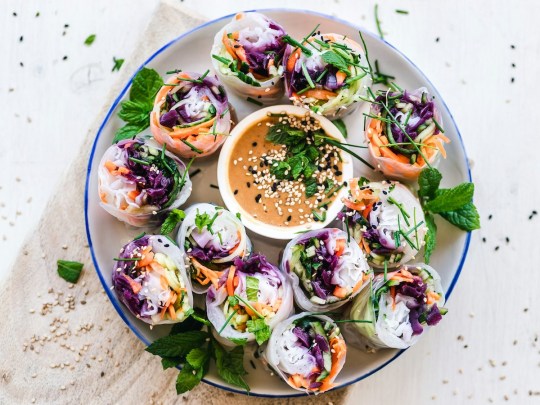
Veganism has gained significant traction in recent years, and for good reason. It's not just a passing trend; it's a movement that aligns with our desire for a healthier, more sustainable planet. By adopting a plant-based lifestyle, individuals contribute to their own well-being while making a positive impact on the world around them.
The power of plant-based living is becoming increasingly evident as veganism is not just a dietary choice, it's a lifestyle that encompasses compassion, health, and environmental consciousness. Discover the principles of veganism, the health benefits of a plant-based diet, its environmental impact, ethical considerations, tips for transitioning to a vegan lifestyle, and addressing common concerns.
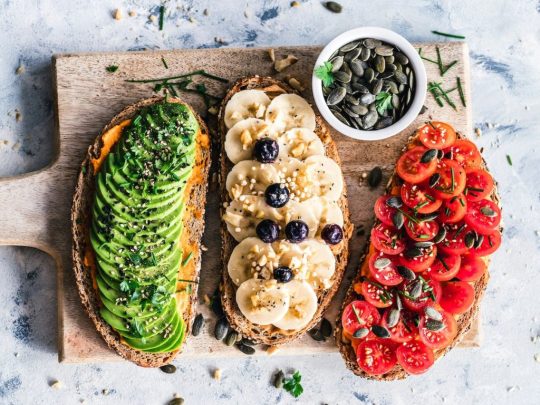
What is Veganism?
At its core, veganism is a philosophy that seeks to exclude all forms of animal exploitation and cruelty, whether in diet, clothing, or any other aspect of life. It's an ethical stance that promotes compassion towards all sentient beings and recognizes the interconnectedness of humans, animals, and the environment.
Health Benefits of a Plant-Based Diet
Embracing a plant-based diet can have profound effects on our well-being, and there are significant health benefits:
Nutritional Advantages: Plant-based diets are rich in vitamins, minerals, and fiber, providing essential nutrients for optimal health.
Disease Prevention: Studies have shown that plant-based diets can reduce the risk of chronic diseases such as heart disease, diabetes, and certain types of cancer.
Weight Management: A plant-based diet, when balanced and varied, can support healthy weight loss and weight management.
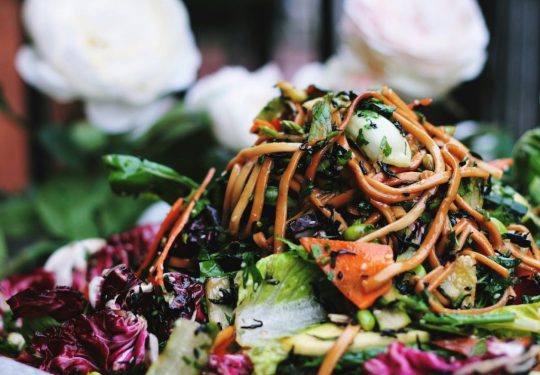
Environmental Impact of Veganism
The environmental consequences of animal agriculture are staggering. By adopting a vegan lifestyle, we can significantly reduce our ecological footprint.
Reduction of Greenhouse Gas Emissions: Animal agriculture is a major contributor to greenhouse gas emissions. By eliminating animal products from our diet, we can reduce our carbon footprint.
Conservation of Resources: Animal agriculture requires vast amounts of land, water, and feed. Shifting to plant-based alternatives allows for more efficient use of resources.
Preservation of Wildlife: Animal agriculture is a leading cause of deforestation and habitat destruction. Choosing plant-based options helps protect biodiversity and wildlife habitats.
Ethical Considerations
Ethics is at the core of veganism. By adopting a vegan lifestyle, we actively express our compassion for animals and advocate for their rights. Veganism encourages the use of cruelty-free alternatives and challenges societal norms regarding the treatment of animals.
Tips for Transitioning to a Vegan Lifestyle
Transitioning to a vegan lifestyle can be a gradual process. Here are some tips to help you navigate the journey:
Gradual Changes and Substitutions: Start by incorporating more plant-based foods into your diet and gradually eliminate animal products.
Meal Planning and Grocery Shopping: Plan your meals in advance and explore the abundance of vegan options available. Stock your pantry with wholesome plant-based ingredients.
Seek Support and Community: Connect with like-minded individuals, join vegan groups, and seek support from friends and family who understand and respect your choices.
Addressing Common Concerns
Transitioning to a vegan lifestyle often comes with questions and concerns. Let's address some common ones:
Protein Intake: Plant-based diets can provide ample protein through sources such as legumes, tofu, tempeh, and quinoa.
Nutrient Deficiencies: With proper planning and a varied diet, vegans can meet their nutritional needs. Pay attention to sources of vitamins B12, iron, and omega-3 fatty acids.
Social Challenges: Dining out or attending social events as a vegan may require some adjustments. Communicate your dietary preferences in advance, and be prepared with vegan-friendly alternatives.
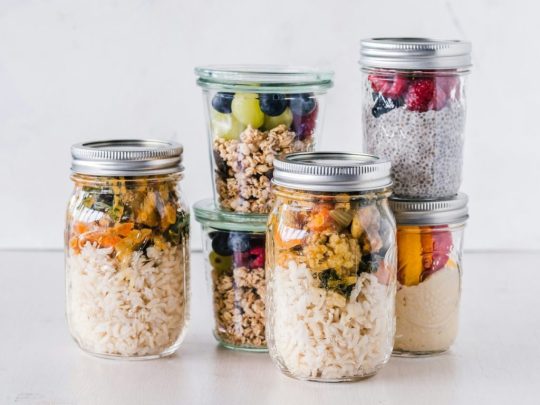
Vegan Recipe Suggestions
Here are a few easy to prepare and delicious vegan recipe suggestions to try:
Vegan Buddha Bowl: A colorful and nourishing bowl packed with a variety of vegetables, whole grains, and plant proteins.
Black Bean Tacos: Flavorful and satisfying, these tacos showcase how classic dishes can be made vegan without sacrificing taste.
Overnight Oats: A simple and nutritious breakfast option that can be customized with your favorite toppings and flavors.
Lentil Bolognese: A hearty and comforting meal that highlights the protein potential in vegan foods.
Additional Resources
For further exploration of veganism and its benefits, here are some recommended resources:
"How Not to Die" by Dr. Michael Greger: A comprehensive book that extensively covers the health benefits of a plant-based diet.
"Forks Over Knives" documentary: A compelling film that explores the correlation between diet and disease, highlighting the power of plant-based nutrition.
The Vegan Society website: A comprehensive online resource for anyone interested in veganism. It offers a range of information from basic principles to practical advice, recipes, and more.
"Earthlings" documentary: A thought-provoking film that sheds light on the ethics of animal use in various industries, encouraging viewers to reevaluate their choices.
Transitioning to a vegan lifestyle is not just a personal choice but it should be a conscious decision to make a positive impact on your health, the environment, and to do your part in protecting animal welfare. Start living a plant-based lifestyle and contribute to a more sustainable and compassionate world today. Every step you take on this journey matters. Embrace the power of plants, explore new flavors, and savor the incredible benefits that veganism brings to your life.
Read the full article
12 notes
·
View notes
Text
Ang Chong Yi - Reasons for choosing a plant-based diet
If cancer prevention is something you need to consider, start with your diet. When it comes to reducing the risk of cancer, you should think in terms of diet instead of food. And a plant-based diet is the best when it comes to lowering the risk of cancer.
A plant-based diet doesn’t mean you can’t consume meat. A plant-based diet means most of the foods in your meals are plants, such as fruits, whole grains, and vegetables. Nuts, seeds, and beans are also included in this diet.

Ang Chong Yi talks about the health benefits of a plant-based diet in this article. If you are interested in the ethical side of going vegan, read Ang Chong Yi - views on ethical reasons to choose Plant-based foods.
Here are some reasons to eat a plant-based diet:
Plant foods and diet supports your immune system.
Nutrients that are necessary for life are rich in plants. Your body's balance and the health of your cells are maintained by the vitamins, minerals, phytochemicals, and antioxidants found in plants. So, a plant diet allows your immune system to stay healthy.
Plants provide your body with the nutrients it needs to fend against illness. Eating a plant-based diet helps to boost your immune system's ability to fight against infections and microbes.
A robust immune system is crucial for lowering your chance of developing cancer because it can identify and combat cell abnormalities before they become diseases.
Plant foods reduce inflammation.
The unavoidable nutrients found in plant food support your body in reducing inflammation. They eliminate pollutants, processed foods, bacteria, viruses, and other toxins.
All these so-called free radicals that can upset your body's balance are captured by the antioxidants found in plant foods. So, it's crucial to follow a plant-based diet and pay attention to your body's signals about what foods are best for you to reduce inflammation.
A plant-based diet keeps you in optimal weight range.
Hormone imbalance and inflammation are brought on by being overweight, and obesity causes so many other diseases.
You eliminate a lot of the things that cause weight gain if you eat a plant-based diet. You're also on the right track to losing weight if you include exercise.
Plant food options are high in fiber.
All foods made from raw plants contain fiber. Fibre gives the plant its structure, and increasing your fiber intake will boost your health greatly.
A plant-based diet helps your gut recover, which makes it easier for you to absorb the nutrients that strengthen your immune system and lower inflammation from food. In addition to being excellent for gastrointestinal management, fiber can balance blood sugar and
decrease cholesterol.
A plant-based diet prevents all types of life-threatening diseases.
Eating a plant-based diet has several advantages beyond lowering your chance of cancer. A plant-based diet has also been demonstrated to lower the chance of developing diabetes, heart
disease, stroke, and some mental health conditions.
Final thoughts
Following a healthy plant-based diet also lets you enjoy other foods linked with problems. If you are responsible for your diet and want to explore something tasty, read Indulge Your Desires: Global Sweet Treats Explored by Ang Chong Yi.
9 notes
·
View notes
Text
Economic Benefits of Vegan Food Products: Saving Money and Health
Introduction
The shift towards veganism is often associated with health benefits and environmental sustainability, but it's also important to recognize the economic advantages. Choosing Vegan Food Products can lead to significant savings both in terms of grocery bills and long-term healthcare costs. This article explores how adopting a vegan diet can be financially beneficial while enhancing overall health.
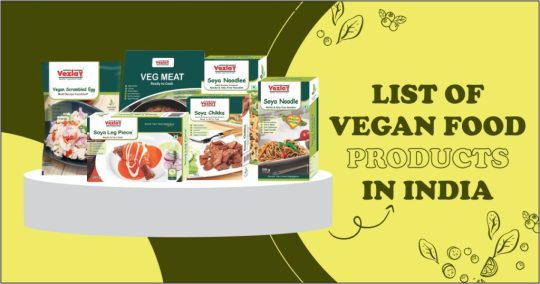
Cost Savings on Groceries
Affordable Plant-Based Staples
One of the most compelling economic benefits of a Vegan Products is the affordability of plant-based staples. Foods such as beans, lentils, rice, potatoes, and vegetables are generally less expensive than meat and dairy products. These staples form the basis of many nutritious and satisfying vegan meals.
Seasonal and Local Produce
Buying seasonal and locally-sourced produce can further reduce costs. Seasonal vegetables and fruits are often cheaper because they are abundant and don't require extensive transportation. Shopping at local farmers' markets can also provide fresh, affordable produce.
Bulk Purchasing
Vegan staples like grains, legumes, and nuts can be bought in bulk, which is often more economical. Purchasing these items in larger quantities reduces the cost per unit and ensures a steady supply of healthy, non-perishable foods.
Reduced Food Waste
Vegan diets often lead to less food waste since plant-based foods typically have longer shelf lives compared to animal products. This can save money by reducing the frequency of grocery shopping and minimizing food spoilage.
Reduced Healthcare Costs
Lower Risk of Chronic Diseases
Adopting a vegan diet can reduce the risk of chronic diseases such as heart disease, type 2 diabetes, and certain cancers. Preventing these conditions can lead to substantial savings on medical expenses, medications, and treatments. A diet rich in fruits, vegetables, whole grains, and legumes promotes heart health, helps manage blood sugar levels, and provides protective antioxidants.
Weight Management and Related Costs
A plant-based diet can aid in weight management, which reduces the risk of obesity-related conditions such as hypertension and joint problems. Maintaining a healthy weight can decrease the need for weight loss programs, medications, and surgeries, leading to significant healthcare savings.
Lower Pharmaceutical Costs
By following a vegan diet that prevents and manages chronic diseases, individuals can reduce their reliance on medications, which can be expensive over time. Lower pharmaceutical costs can significantly impact an individual’s overall healthcare expenses.
Meal Preparation and Eating Out
Cooking at Home
Preparing meals at home is generally more cost-effective than dining out, and vegan cooking can be particularly budget-friendly. Simple, wholesome ingredients can be transformed into delicious meals without the need for expensive meat substitutes or specialty items.
Affordable Dining Options
Many restaurants now offer vegan options at competitive prices. Fast-casual and ethnic eateries often have vegan dishes that are both affordable and flavorful. Exploring these options can provide budget-friendly dining experiences without compromising on taste or nutrition.
Meal Planning and Batch Cooking
Planning meals and cooking in batches can save both time and money. By preparing meals in advance, individuals can avoid the temptation of ordering takeout and ensure they have healthy, affordable options readily available.
Long-Term Financial Benefits
Increased Productivity
A healthy diet can enhance overall well-being, leading to increased productivity and reduced absenteeism at work. By staying healthy, individuals can potentially avoid lost income due to illness and maintain higher levels of performance in their professional lives.
Longevity and Quality of Life
Investing in a healthy diet can contribute to a longer, more active life. Reduced medical expenses and the ability to enjoy life without the burden of chronic illness can provide significant financial and personal rewards in the long term.
Retirement Savings
With lower healthcare costs and improved health, individuals can potentially save more for retirement. The financial savings from reduced medical expenses can be redirected towards retirement funds, providing a more secure financial future.
Environmental Savings
Reduced Environmental Impact
Vegan diets have a lower environmental impact, which can translate to economic benefits on a broader scale. Reduced greenhouse gas emissions, lower water usage, and less deforestation associated with plant-based diets can lead to cost savings in environmental conservation efforts and healthcare related to pollution and climate change.
Sustainable Food Systems
Supporting plant-based food systems can promote sustainability and resilience in agriculture. This can lead to more stable food prices and security, benefiting both consumers and the economy as a whole.
Government and Policy Impacts
As more individuals adopt plant-based diets, there may be shifts in agricultural policies and subsidies. Governments might redirect funds towards sustainable farming practices, leading to broader economic benefits and support for eco-friendly initiatives.
Personal Financial Management
Budget-Friendly Lifestyle
Adopting a vegan lifestyle can simplify budgeting. By focusing on whole, plant-based foods, individuals can avoid the higher costs associated with processed and convenience foods, leading to better financial management.
Reduced Spending on Supplements
While some nutrients may need to be supplemented in a vegan diet, the overall need for supplements can be lower if the diet is well-balanced and diverse. This can reduce the spending on various health supplements often needed in less balanced diets.
Ethical Investments
Choosing vegan products can align with ethical financial practices. Supporting companies that prioritize sustainability and animal welfare can lead to more conscious spending and investment decisions, promoting long-term financial health and social responsibility.
More information about vezlay foods:
Name: Vezlay Foods
Phone No: 7011736463
Address: A1/1, Nathu Colony Chowk Shahdara, New Delhi - 110093, INDIA
Website: https://vezlay.com/blog/list-of-vegan-food-products-in-india/
3 notes
·
View notes
Text
Something I see online that's frustrating to me is you'll get people telling the vegan activists who promote veganism as a universal ideal that there are disabled people who can't have a vegan diet, but then a lot of the people who point this out don't seem to know what conditions actually cause that. And then you end up having arguments about that so I want to actually point out a few examples
I think the number one example where there's no way to safely, healthfully avoid having to consume animal products is haemodialysis for kidney failure. People on dialysis need more protein than other people because they lose protein and blood cells during the dialysis process, and they are required to have a low potassium diet because their kidneys can't filter potassium. This means legumes and soy aren't viable alternatives. [x] "Renal dietitians encourage most people on haemodialysis to eat high-quality protein because it produces less waste for removal during dialysis. High-quality protein comes from meat, poultry, fish, and eggs." [x] If you can't meet your protein needs with these foods for whatever reason, you'll be prescribed whey protein powder, which is made from dairy. [x]
Ketogenic diets are also high in animal proteins. They're innately low carb and high in fat, which means legumes and other meat alternatives aren't a great fit. "The ketogenic diet can boost insulin sensitivity and cause fat loss, leading to significant health benefits for people with type 2 diabetes or prediabetes." [x] PCOS, a common condition effecting about 10% of people who menstruate, is also often treated with a low carb, high protein diet because it involves insulin resistance. [x]
Ketogenic diets may also be recommended to treat seizures in epilepsy. [x] It is most frequently used for focal seizures in children, infantile spasms, Rett syndrome, tuberous sclerosis complex, Dravet syndrome, Doose syndrome, and GLUT-1 deficiency. In these conditions, ketogenic diets can reduce or even eliminate seizures.
People with food allergies can find it difficult to afford safe and healthy food in general. [x] The inability to rely on cheap, plant-based proteins like canned beans or dried lentils can be a general hardship, especially when disabilities themselves can limit job opportunities or the capacity to work.
Intestinal disorders are another factor that can make vegan diets difficult. Foods high in insoluble fibre, like beans and other legumes, as well as nuts and seeds, can cause Crohn's flare ups in some people. [x] Seeds, nuts, and legumes can also be trigger foods for people with ulcerative colitis. [x] IBD flare ups are not like a run-of-the-mill case of intestinal discomfort. They can land people in the hospital and require major surgery. [x]
For allergies, the main factor that can make a vegan diet difficult isn't allergy to specific vegetables, but to specific plant proteins. Someone who is allergic to soy, peanuts, or other legumes will have more limited options for meeting their daily protein requirements on a vegan diet. People with allergies to a broad spectrum of legumes may not have any reasonable substitution options. Substitutions can also increase the price point and make a vegan diet too expensive for people in poverty who also have allergies. Poor people with food allergies may find it difficult in general to afford a safe and healthy diet. [x]
For some people, including some disabled people, a vegan diet may in fact be ideal. Vegan diets can certainly be part of a healthy diet when trying to reduce bad cholesterol [x], treat high blood pressure [x], or treat earlier stages of kidney disease. [x] And while insulin resistance may be best treated with a ketogenic diet in some people, others do seem to benefit from a plant-based diet instead. [x] A person's diabetes specialist and trained dietitians can help them figure out which is best for them, potentially based on other factors like whether or not they have high blood pressure or bad cholesterol, or whether their diabetes risks are linked to PCOS or other known metabolic conditions.
Achieving sustainable food production and equal access to a safe, nutritious, well-balanced diet is fundamental to us all. But there's simply no one-size-fits-all ideal human diet, and that's something everyone needs to take into account.
30 notes
·
View notes
Text
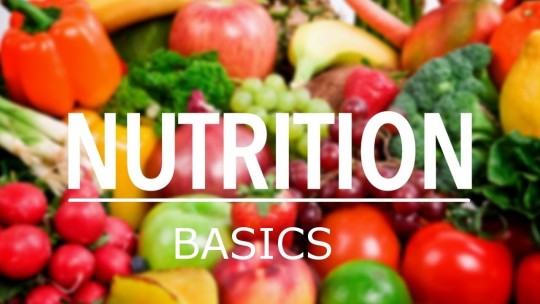
Nutrition Basics for a Healthy Lifestyle: What You Need to Know
Introduction:
Nutrition is the cornerstone of a healthy lifestyle. The food you eat not only fuels your body but also impacts your overall well-being. Understanding the basics of nutrition can help you make informed choices about what to eat, leading to improved health and vitality.
Balanced Diet: A balanced diet includes a variety of foods from all food groups: fruits, vegetables, grains, protein foods, and dairy (or dairy alternatives). Each group provides essential nutrients your body needs to function properly.
Fruits and Vegetables: Aim to fill half your plate with fruits and vegetables at each meal. These foods are rich in vitamins, minerals, fiber, and antioxidants, which support immune function and reduce the risk of chronic diseases.
Grains: Choose whole grains like brown rice, quinoa, oats, and whole wheat bread over refined grains. Whole grains are higher in fiber and nutrients, promoting better digestion and long-term health.
Protein Foods: Include a variety of protein sources in your diet, such as lean meats, poultry, fish, eggs, beans, lentils, tofu, and nuts. Protein is essential for building and repairing tissues, as well as for producing hormones and enzymes.
Dairy (or Alternatives): Dairy products like milk, yogurt, and cheese provide calcium, vitamin D, and protein. If you're lactose intolerant or follow a vegan diet, opt for fortified plant-based alternatives like almond milk, soy yogurt, or tofu.
Portion Control: Paying attention to portion sizes is crucial for maintaining a healthy weight and preventing overeating. Use visual cues like your hand or everyday objects to estimate portion sizes:
A serving of meat or fish should be about the size of your palm.
A serving of grains or starchy foods should be about the size of your fist.
A serving of fruits or vegetables should be about the size of a tennis ball.
A serving of fats or oils should be about the size of your thumb.
Hydration: Staying hydrated is essential for overall health and well-being. Aim to drink plenty of water throughout the day, and limit sugary drinks like soda and fruit juices. Herbal teas and infused water can add variety to your hydration routine.
Limit Added Sugars and Processed Foods: Excess sugar consumption is linked to various health issues, including obesity, type 2 diabetes, and heart disease. Limit foods and beverages high in added sugars, such as candy, soda, pastries, and sugary cereals. Instead, satisfy your sweet tooth with naturally sweet foods like fruits.Additionally, minimize your intake of processed and ultra-processed foods, which often contain unhealthy fats, excessive sodium, and additives. Opt for whole, minimally processed foods whenever possible.
Listen to Your Body: Pay attention to hunger and fullness cues, and eat mindfully. Slow down and savor each bite, and stop eating when you feel satisfied, not stuffed. Eating when you're hungry and stopping when you're full can help maintain a healthy weight and prevent overeating.
Conclusion:
By following these nutrition basics, you can support your overall health and well-being, boost energy levels, and reduce the risk of chronic diseases. Remember, small changes can lead to big improvements in your health over time. Start with simple adjustments to your diet and build on them gradually for long-term success.
#nutrition#health#wellness#healthy living#health tips#nutrition basics#healthcare#fitness#diet#health and wellness#healthy lifestyle
3 notes
·
View notes
Text

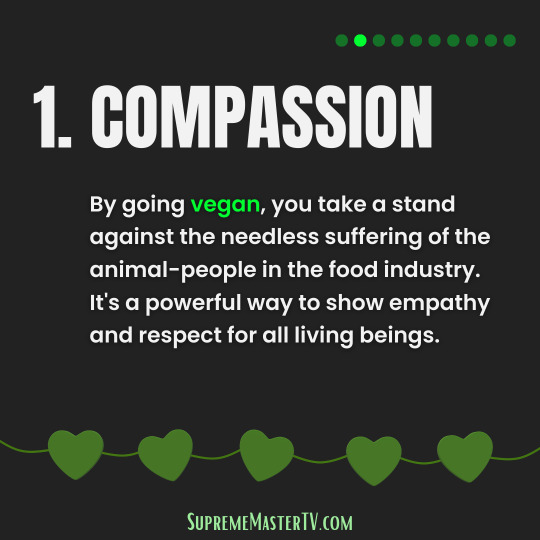
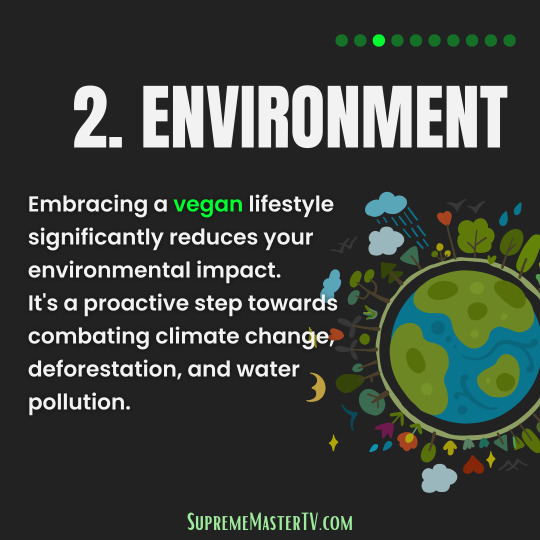
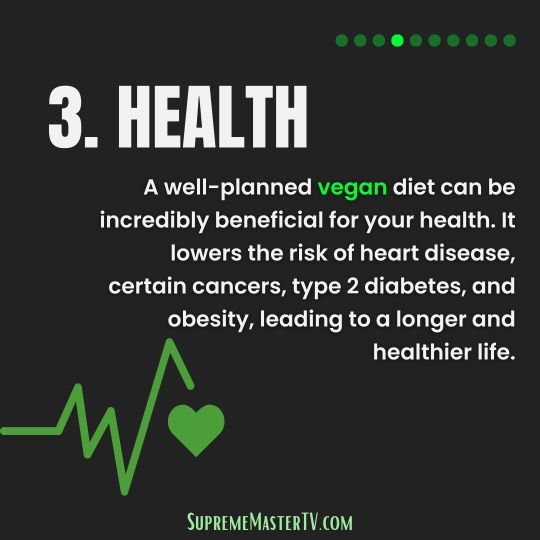
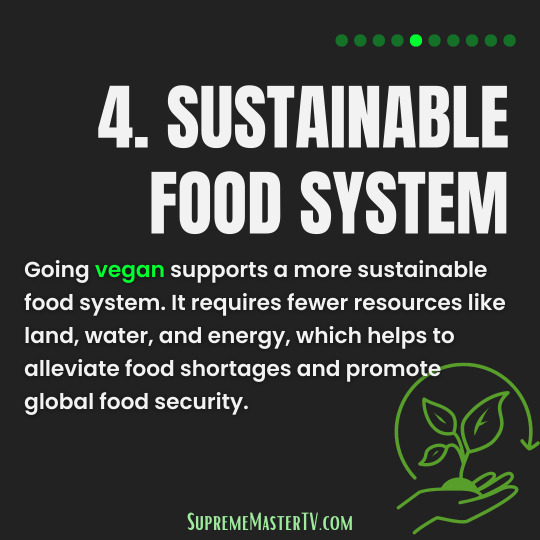

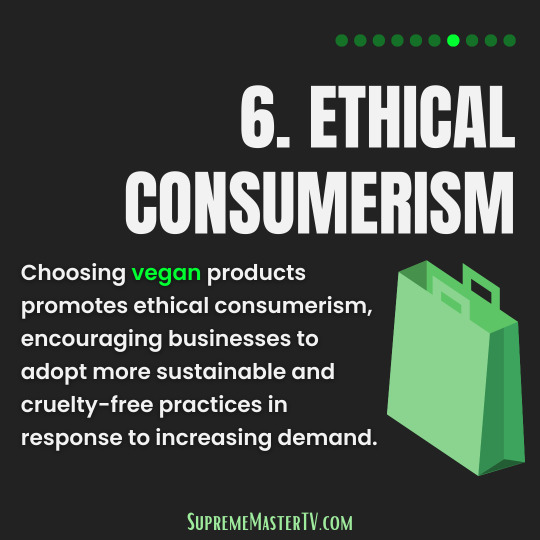
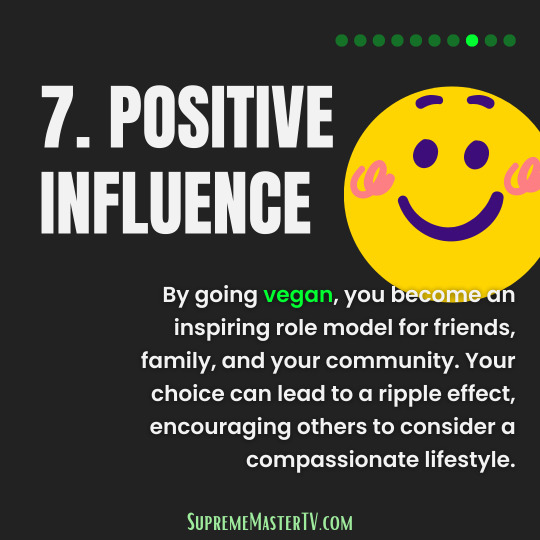

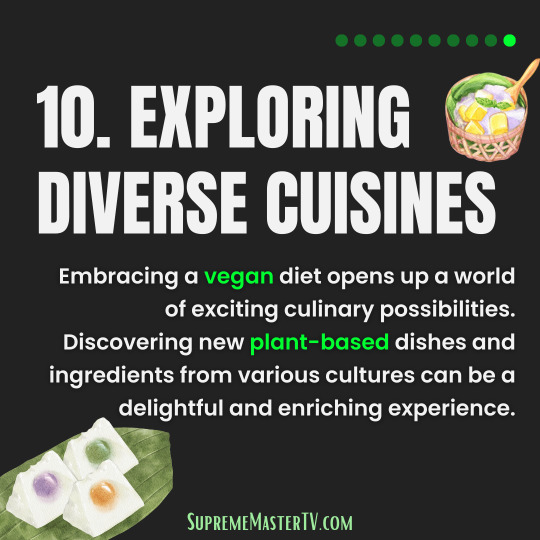
Top 10 Reasons to Go Vegan:
Compassion for animal-people: By going vegan, you take a stand against the needless suffering of the animal-people in the food industry. It's a powerful way to show empathy and respect for all living beings.
Protecting the environment: Embracing a vegan lifestyle significantly reduces your environmental impact. It's a proactive step towards combating climate change, deforestation, and water pollution.
Improved personal health: A well-planned vegan diet can be incredibly beneficial for your health. It lowers the risk of heart disease, certain cancers, type 2 diabetes, and obesity, leading to a longer and healthier life.
Sustainable food system: Going vegan supports a more sustainable food system. It requires fewer resources like land, water, and energy, which helps to alleviate food shortages and promote global food security.
Enhanced energy and vitality: Many vegans report feeling more energetic and rejuvenated after adopting a plant-based diet, which positively impacts productivity and overall well-being.
Ethical consumerism: Choosing vegan products promotes ethical consumerism, encouraging businesses to adopt more sustainable and cruelty-free practices in response to increasing demand.
Positively influencing others: By going vegan, you become an inspiring role model for friends, family, and your community. Your choice can lead to a ripple effect, encouraging others to consider a compassionate lifestyle.
Supporting biodiversity: The vegan lifestyle plays a role in preserving biodiversity and protecting endangered species by reducing habitat destruction and land use for animal agriculture.
Mitigating antibiotic resistance: By avoiding animal products, you contribute to the fight against antibiotic resistance, which is a growing public health concern worldwide.
Exploring diverse cuisines: Embracing a vegan diet opens up a world of exciting culinary possibilities. Discovering new plant-based dishes and ingredients from various cultures can be a delightful and enriching experience.
Overall, going vegan is a powerful and positive choice that benefits the animal-people, the planet, and your health. It empowers you to make a difference and contribute to creating a more compassionate, sustainable, and harmonious world for everyone.
🌿 Be Vegan, Make Peace 🕊 Do Good Deeds 💗
SupremeMasterTV.com
#SupremeMasterTV#PlantBasedLiving#VeganLifestyle#CrueltyFree#Top10#VeganCommunity#VeganForTheAnimals#GoVegan#VeganAwareness#VeganInspiration#VeganActivism#VeganSupport#VeganGains
6 notes
·
View notes
Text
Peanuts: A nutrient-rich and versatile snack with many health benefits
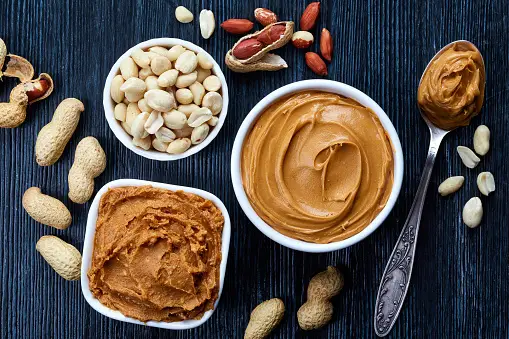
Peanuts are a type of legume that is native to South America. They are one of the most popular snack foods in the world, and for good reason. Peanuts are packed with nutrients and have been linked to a number of health benefits.
**Nutritional value of peanuts:**
Peanuts are a good source of:
* Protein: Peanuts are a good plant-based source of protein, making them a good choice for vegetarians and vegans. One ounce of peanuts contains approximately 6 grams of protein.
* Healthy fats: Peanuts contain mostly monounsaturated and polyunsaturated fats, which are good for heart health. Monounsaturated fats can help to lower LDL (bad) cholesterol levels and raise HDL (good) cholesterol levels. Polyunsaturated fats can also help to lower LDL cholesterol levels.
* Fiber: Peanuts are a good source of fiber, which can help to keep you feeling full and satisfied. Fiber can also help to improve digestion and regularity. One ounce of peanuts contains approximately 3 grams of fiber.
* Vitamins and minerals: Peanuts contain a variety of vitamins and minerals, including vitamin E, magnesium, potassium, and niacin. Vitamin E is an antioxidant that can help to protect cells from damage. Magnesium is important for muscle and nerve function. Potassium is important for blood pressure regulation. Niacin is important for energy metabolism and skin health.
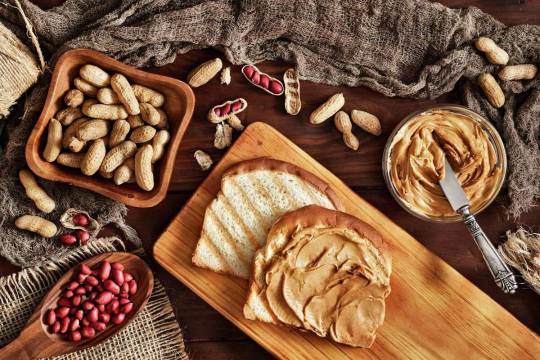
**Health benefits of peanuts:**
Peanuts have been linked to a number of health benefits, including:
* Reduced risk of heart disease: The healthy fats and antioxidants in peanuts can help to lower cholesterol levels and improve blood vessel health. A study published in the journal *Circulation* found that people who ate peanuts or peanut butter at least five times per week had a 14% lower risk of death from heart disease than those who did not eat peanuts or peanut butter.
* Improved blood sugar control: Peanuts have a low glycemic index, meaning they do not cause a rapid spike in blood sugar levels. This makes them a good snack option for people with diabetes or prediabetes. A study published in the journal *Diabetes Care* found that people with type 2 diabetes who ate peanuts or peanut butter as part of a healthy diet had lower blood sugar levels and less insulin resistance than those who did not eat peanuts or peanut butter.
* Weight management: Peanuts are high in protein and fiber, both of which can help you to feel full and satisfied. This can lead to reduced calorie intake and weight loss over time. A study published in the journal *Obesity* found that people who ate peanuts or peanut butter as part of a low-calorie diet lost more weight and body fat than those who did not eat peanuts or peanut butter.
* Cancer prevention: Some research suggests that peanuts may help to protect against certain types of cancer, such as colon cancer and breast cancer. A study published in the journal *Cancer Epidemiology, Biomarkers & Prevention* found that people who ate peanuts or peanut butter at least twice per week had a 27% lower risk of developing colon cancer than those who did not eat peanuts or peanut butter. A study published in the journal *Breast Cancer Research and Treatment* found that women who ate peanuts or peanut butter at least five times per week had a 22% lower risk of developing breast cancer than those who did not eat peanuts or peanut butter.
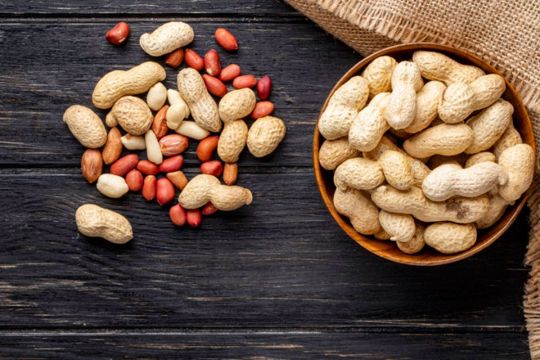
**How to incorporate peanuts into your diet:**
Peanuts can be eaten raw, roasted, or salted. They can also be used to make peanut butter, peanut oil, and other peanut products. Peanuts can be incorporated into a variety of dishes, including salads, soups, stews, and stir-fries.
Here are some tips for incorporating peanuts into your diet:
* Add a handful of peanuts to your breakfast cereal, oatmeal, or yogurt.
* Spread peanut butter on whole-wheat bread or crackers for a healthy snack or sandwich.
* Add peanuts to salads, soups, stews, and stir-fries.
* Snack on peanuts instead of unhealthy snacks like chips or candy.
* Make your own peanut butter at home using raw peanuts and a blender.
**Conclusion:**
Peanuts are a nutritious and versatile snack food with many health benefits. They are a good source of protein, healthy fats, fiber, and vitamins and minerals. Peanuts have been linked to a number of health benefits, including reduced risk of heart disease, improved blood sugar control, weight management, and cancer prevention. Peanuts can be easily incorporated into a variety of dishes, making them a healthy and convenient food choice for everyone.
#healthy#health#help#healthcare#headlines today news#headline news#self healing#heartbreak#healthy diet#business news#breaking news#blog#latest news#natural remedy#nutritious#world news#nature#news#money#beautiful#beauty#low cal diet#weight loss diet#life#love#long reads#liveblogging#literature#journal#gorgeous
3 notes
·
View notes
Text
Alkaline Vegan Healing Guide PDF FREE, Read Online | Dr Sebi
Dr. Sebi's Alkaline Vegan Healing Guide is a plant-based diet that focuses on consuming alkaline foods to restore the body's natural pH balance and promote healing. The diet is based on the belief that disease is caused by an acidic environment in the body, and that eating alkaline foods can help to neutralize this acidity and create an environment in which the body can heal itself. Here's Alkaline Vegan Healing Guide Book PDF Download Free. A Most Popular read book by Dr Sebi.

The diet consists of a variety of fruits, vegetables, herbs, and spices, all of which are alkaline-forming. Alkaline foods are rich in minerals and antioxidants, which are essential for good health. Dr. Sebi also recommends using certain herbs and supplements to help with detoxification and healing.
Dr. Sebi's Alkaline Vegan Healing Guide has been used by many people to improve their health and heal from a variety of chronic diseases, including cancer, diabetes, heart disease, and autoimmune disorders. The diet is also said to be effective for weight loss, improved energy levels, and overall better health.
Dr. Sebi’s diet is a plant-based alkaline diet. It helps rejuvenate cells in your body by getting rid of toxic waste. The bulk of this diet consists of an approved shortlist of foods along with supplements. Dr. Sebi’s diet also helps in lupus, AIDS, kidney disease, and others. Treatments for these diseases require you only to eat certain grains, fruits, and vegetables, strictly refraining from animal products.
The goal of this two-book bundle is simple: teach yourself how to follow Dr. Sebi’s diet and keep at bay and have a healthy life.
Among the main topics of this book, you will find:
What Dr. Sebi’s Alkaline Diet Is and How It Works, Dr. Sebi’s Approved Supplements, Food List, And Herbs, A 7-Day Full-Body Plan To Detox the liver and other vital organs, How To Cleanse Your Body And Improve Your Health, The Most Effective Treatments and Cures for lupus, hair loss, asthma, and other health issues without depending on any western treatment and lot more.
Alkaline Vegan Healing Guide Book - PDF
The 9 Most Potent Medical Herbs To Cure Herpes In 7 Days without spending a fortune in traditional medicines
Here are some of the key principles of Dr. Sebi's Alkaline Vegan Healing Guide:
Eat plenty of fruits, vegetables, herbs, and spices.
Avoid acidic foods, such as meat, dairy, processed foods, and sugary drinks.
Drink plenty of alkaline water.
Use certain herbs and supplements to help with detoxification and healing.
If you are considering following Dr. Sebi's Alkaline Vegan Healing Guide, it is important to talk to your doctor first, especially if you have any underlying health conditions.
So, Follow this Dr Sebi's Vegan Diet Routine and Restore your Body's Ability and Achieve long and healthy life
3 notes
·
View notes
Text
Your Path to Wellness: Finding the Right Dietitian or Nutritionist in London
Introduction:
In the bustling city of London, where a fast-paced lifestyle is the norm, maintaining a balanced London Dietitian can be a challenge. Whether you're seeking guidance for weight management, dealing with dietary restrictions, or simply aiming to improve your overall health, the expertise of a qualified it can be invaluable. In this blog, we'll explore the importance of their roles and how to find the best dietitian or nutritionist near you in London.
1. The Role of a Dietitian and Nutritionist:
Dietitian are professionals who specialize in food and nutrition. While their roles are similar, there are some differences:
Dietitians: Registered dietitians (RDs) have a recognized qualification and are regulated by a professional body. They provide evidence-based dietary advice, especially for medical conditions like diabetes or allergies.
Nutritionists: Nutritionists may not always be registered dietitians but can provide general nutrition guidance and support for overall well-being.
2. Why Consult a Dietitian or Nutritionist:
Personalized Guidance: They can create personalized Dietitian near me plans tailored to your unique needs and goals.
Disease Management: Dietitians are equipped to help manage chronic conditions like diabetes, heart disease, and gastrointestinal disorders through diet.
Weight Management: They can assist in healthy weight loss or gain, addressing both physical and emotional aspects.
Allergies and Intolerances: If you have food allergies or intolerances, they can help you create safe and nutritious meal plans.
Lifestyle Changes: Whether you're transitioning to a vegan diet or seeking guidance for a specific dietary lifestyle, they can provide support.
3. Finding a Dietitian or Nutritionist in London:
Online Directories: Websites like the NHS or professional bodies often have directories that can help you find registered dietitians or nutritionists near you.
Recommendations: Seek recommendations from friends, family, or healthcare providers who may know qualified professionals.
Online Platforms: Use online platforms like Google or Yelp to find reviews and ratings of dietitians or nutritionists in London.
4. Questions to Ask Potential Dietitians or Nutritionists:
Qualifications: Ensure they have the necessary qualifications and are registered with a recognized professional body.
Experience: Inquire about their experience and specialization, especially if you have specific health concerns.
Approach: Ask about their approach to nutrition and whether it aligns with your goals and preferences.
Cost and Availability: Discuss their fees, availability, and whether they accept insurance.
5. The Journey to a Healthier You:
Consulting a Nutritionist near me is a proactive step toward achieving your health and wellness goals. Their expertise can empower you to make informed dietary choices, develop healthier habits, and enhance your overall quality of life. Whether you're managing a specific condition or simply seeking a more balanced diet, the guidance of a qualified professional in London can be the key to your path to wellness.
2 notes
·
View notes
Note
hey! i wanted to ask u something. im a vegan about 6 years now and i have a diabetic dog so we took him to the dog’s nutritionist this year. she made him a lot of recipes with meat, very types of meat and also vegetables etc and we bought meat to cook him - i didn’t cook it directly bc i can’t but still - and i’m kinda conflicted bc i didn’t want to buy meat for him but i’m following the nutritionist’s orders since we don’t want to buy dog food anymore, we wanted to cook his food and drop everything that’s ultra processed. we wanted everyone in the house to drop processed food tbh to improve our health. and i read that a good diet (or vegan diet) can help humans with diabetes, so i wanted to see if we could help our diabetic dog with natural food. anyway, i don’t consume the meat i buy but i think i couldn’t call myself vegan anymore since i’m buying it and stocking in my fridge. i haven’t found any dog nutritionist who would recommend a veggie diet… i’m not from the us or europe too so here i really didn’t find anyone. so i wanted to ask u what you think. i’m not a vegan anymore i guess? i feel guilty but i want the best for my dog too and the doctor insisted on meat. the dog food we used to buy before had meat on it too probably, we bought one specially for diabetes.
I think that you are treating veganism to be a strict set of rules that can’t be broken or bent, as opposed to the ethical principle that it is. Being vegan means one thing: avoiding animal exploitation as far as is possible and practicable. That’s it. If you are doing that (and it sounds like you very much are) then you are vegan - it really is as uncomplicated as that.
You have an animal in your care, and it is your responsibility to maintain their health and well-being. Based on the expert advice you are receiving, it seems that maintaining their health means buying them meat, so that is what you are doing. I would do the same thing in your position, and I’d still be vegan. I hope your dog’s health improves on their new diet, and that you can learn to be a little bit gentler with yourself, anon.
15 notes
·
View notes
Note
Are you doing your au pair with a company or independent? I have been considering doing one for years to improve my french and would take any advice you give!
First off, brave decision my friend! Chapeau to that!
I'm here with an agency but I know others who are here without and found a placement through aupairworld.com
With an agency (depends on the agency I believe) your stay will cost a bit more than if you go on your own. I think I still have a 450-500€ fee to pay. That does not include flight etc. Also I had to fill out a whole lot of documents with 2 references from people outside my family that prove I have experience with children and describe the type of person I am and a lot more other stuff. Lots of bureaucracy. Maybe it's just Germany but it would make sense... after all not everyone is and should be qualified as Au Pair to work with kids.
However, with an agency you have two persons you can contact if you have problems/questions/anything. One in your home country and one in the host country. That can come in handy when you turn out to have problems with your host family or get kicked out for whatever reason(s). The agent responsible for me was immediately there to check on me when first host family called them and expressed worry for the placement and later told me they want to end it. The same night I was already sent the profile of another family (my current one) and got the contact info for current host mom and we even immediately could decide on a day to meet each other. The first days, the agent checked on me if everything is going well and if there are problems they will gladly help. They get paid for that after all lol.
As for aupairworld.com - I don't know much about it. I know they don't ask you to pay a fee or something. Not if you're there as Au Pair. As host family they do want you to pay a certain amount of money to make sure you're serious and you treat it with seriousness. Here you get to find your host family on your own. No contact person in-between like with an agency. (You can decline an offered family by an agency too though). So yeah, a lot more independent. The only con would be that in case of problems or the desire to change host families you don't have a helping hand I believe. Not a directly assigned to you one at least. But I don't know enough about the independent way unfortunately.
Find out what you want and what you're comfortable with
Au Pairs work with children. Babies, toddlers, preteens. Teenagers are rare and families with teenagers usually don't require an Au Pair as teens are usually old enough to be on their own. Are you comfortable enough changing diapers or doing potty training and not afraid of cleaning the child's butt and such afterwards? If not then scratch out any family that has a child under the age of 5 (it's best to ask the host family about the matter if the child requires that help). How many children are you willing to take care of? How many do you feel most comfortable with? What ages would you be most comfortable with? What if the child has a handicap, ADHD, autism etc. (the parents NEED to inform the agencies about that because in that case it's better you already have experience with that or are even specialized... obviously). It might be the child is diabetic - are you willing to inject insulin if needed? What about the parents? Are you okay with a single mom or single dad? Or would you prefer a couple? Same-sex couple? (It shouldn't matter at all if it's a same-sex couple or not because it's not your business who loves who but I'm going through the points the agency asked me and they did ask me if that would be okay for me... which is kinda sad) Are you okay with it if one or both smoke? Would you be okay if the family follows a diet you don't (vegetarian or vegan for example)? Is religion important to you? What if it is/isn't important to the family? What if the family (esp. the children) don't speak English or a language you understand/know? Would you like to improve your language skills in host country? Would you like to visit a language school? Does the family allow it? Has the family had Au Pairs before?
You basically need to go through all possible cases to find out what you want in a host family and for your stay abroad.
The host family
I think it's obvious that this is among the most important points. Those people are gonna be your family. Or at least they should be. A simple profile describing the family doesn't give you everything you need to know. It gives you the basic information and what your tasks are but it's always recommended to have some calls (best multiple video calls) with the family that appeals most to you. Get to know them and their expectations at you better. Be sure you are comfortable with them. Listen. To. Your. Gut.
Just as some people should never be Au Pairs, certain families should never host one.
An Au Pair is NOT a cheap babysitter.
An Au Pair is NOT a cheap servant or housekeeper.
An Au Pair SHOULD have free time.
An Au Pair SHOULD have evenings and at least one day a week off - even better if you get the whole weekend off.
An Au Pair SHOULD get paid accordingly for their work.
An Au Pair SHOULD have their own bedroom.
An Au Pair SHOULD get food (and in the best case the family even asks you if you prefer something for breakfast or if you need something food wise and they will provide for it.)
An Au Pair IS a helping hand for the family and acts as older brother or sister.
Being and host an Au Pair is a give and take. You receive housing, food, etc. without paying rent and other stuff and if you do go to a restaurant to eat it's from your pocket money you receive while you support and help in the family.
Don't just pick the first family you get recommended. Seriously consider it through. In case of problems though, there most likely always is the chance of changing host families.
In any case though, you CAN and SHOULD put a full stop where one is needed. If you can't take it, if you don't want to continue for whatever reason that may be, STOP and RETURN HOME.
My experience...
has been a roller-coaster. After thinking I was in good hands with my first host family and thinking we were on common ground it was devastating to hear they no longer want to continue being my host family. We had multiple calls, I was welcomed warmly, I felt comfortable and yes, I was willing to continue being with them until the end of my stay. But it was only when I was truly living with them I realized that our life styles are quite different and while no problem to me, it was one to them. The boys, my host-brothers, were a handful sometimes and yeah, had to endure tantrums and stubbornness but I actually really liked them... well at least the younger two. They were distant first, which is to be expected. It was the same with current host-sisters. Both sides need time getting used to this new situation. And as we humans are all different it will also take both sides a different amount of time to get used. Maybe it will just be a week. Maybe two. It could also take a month... or even more. Don't rush it. Don't be discouraged if after a week your host sister or brother or sibling is still distant when you already got used to them and the situation. A good relationship to your host parents is SO important. Cuz if your host sibling is shitty, sure that's not great either but having the parents against you is worse. They are supposed to be people you can turn to when you have troubles or questions. They are supposed to listen and help you if there is a problem with the or a child. Having a good relationship to them makes the whole thing easier and warmer. Here I must add one important advice for any relationship or working place: Communication is key. Misunderstandings happen. And between strangers - especially strangers from different countries that don't share a native language and communicate over a second language like English - misunderstandings are BOUND to happen. Your host parents will probably not speak perfect English (except for if you are an Au Pair in an English speaking country of course). Your English levels will be a bit apart, I can imagine. And with your host siblings it will most likely be even further apart. There are exceptions but this is the situation you are most likely going to end up in. If there is a misunderstanding or if there is anything else you need to get off your chest COMMUNICATE SO.
Also! Piece of advice: try to get the contact data of former Au Pairs if the family hosted any. Exchange experience with them or ask them for advice when there's problems with your host sibling.
It also proves itself useful to have people you can vent to that aren't your host family. Your friends back home, your family, or a tumblr blog where you spam your followers with whatever situation just happened ;) Maybe a simple a journal/diary does too. Just something or someone you can let it all out on or who you can ask for advice if anything. It's important.
If you have a good relationship to your family or have at least one friend back home, you WILL be homesick at times and miss them terribly. Being abroad is the devil's arse when it comes to this point. You're kinda alone. You will with a very high chance find other Au Pair friends and hang out together, go out for dinner, take city trips outside your host city and more. But you will 100% miss home and that's okay. Your homesickness might bring tears. Let them flow. Like my current host mom said "it's a good thing that you are homesick. It means you are loved at home." and that's a beautiful, bittersweet realization to come to.
Take a plushie with you. Something from your friends. Little things that remind you of home and that give you strength. I for example have a postcard from my former choir conductor that she gifted me at prom with some very sweet and encouraging words on the back of it attached ro my mirror here in my room. Also attached to that mirror is another postcard from the choir with the words "Dear Margarita... we will miss you!" and signatures from all the members of the choir. I have a pusheen plush with me, a t-shirt my best friend brought me from Portugal and my mom's cardigan.
Being an Au Pair is hard. It's a challenge. It's tough. You're miles away from friends and family. You are going to have waves of homesickness overrunning you every now and then.
It's a life experience. One you will hold dear and remember fondly or one you wish was never part of your life. I won't let you believe it's gonna be all happy and a field of dandelions. There will be roses with thorns on your way. It might also be your entire field is just thorns.
I don't want to discourage you, absolutely not. But I wish I had someone tell me there will be these downsides and the possibilities it won't work out at all. It doesn't hurt to be aware of that, I think.
I'm sure you will have a great experience as Au Pair! I tend to share more the negative things here because I need to vent and let it out but there's a lot of good things with my current family too and I'm actually am enjoying my stay.
I would also tell you some things my Au Pair friends have experienced so far but this is already way too long a post dhhdnsnsn
If you need anything else just drop another ask or slide in my dms <3
You got this!
17 notes
·
View notes
Text
Bite Sized Veganism
What is veganism:
“Veganism is a philosophy and way of living which seeks to exclude—as far as is possible and practicable—all forms of exploitation of, and cruelty to, animals for food, clothing or any other purpose; and by extension, promotes the development and use of animal-free alternatives for the benefit of animals, humans and the environment.
In dietary terms it denotes the practice of dispensing with all products derived wholly or partly from animals.”
Veganism is a branch of animal rights activism.
The word veganism refers to both the philosophy and practice.
The word vegan refers both to those that practice veganism and things that do not contain animal products.
Similar to other activist movements, there are many iterations and interpretations of veganism. Some types of veganism also overlap with other movements, such as eco-activism.
Why do people go vegan:
People who eat a vegan diet may be doing so for health reasons, like diabetes, or due to dietary restrictions, like food allergies.
People who live a vegan lifestyle as well as eat a vegan diet may be doing so for environmental reasons, ethical reasons, or philosophical reasons.
Ultimately, there are many reasons why people go vegan and not all of them are the same and not all people practice veganism in the same way.
What veganism is not:
Veganism is not for everyone nor is it a solution to every problem in the universe, much like any other philosophy or activist movement.
Veganism is not in conflict with human rights activism despite animal rights, rather than human rights, being the focus.
Veganism is not a morality contest, it is meant to be practicable. Even something as simple as people reducing their consumption of meat helps the vegan movement despite those people not being vegan themselves.
Veganism is not a diet fad, it is meant to be sustainable. While one may choose to follow a vegan diet in order to get desired health effects, a true vegan diet is balanced to support life long health.
Common misconceptions:
Veganism doesn’t deny that humans are omnivorous by nature. It is because humans are omnivorous that vegans have to be aware of certain deficiencies in their diets and either supplement with plant based sources of those nutrients or take supplemental vitamins.
In that same vein, vegans don’t deny the importance of protein in the human diet. Protein is readily available from many common plant based sources and therefore doesn’t often need to be supplemented in a vegan diet except by choice.
Similarly, veganism does not seek to change nature so that animals do not subsist off of each other. Carnivores, parasites, etc are not in conflict with vegan philosophy. Vegan philosophy explicitly focuses on humans and their impacts on other animals.
Veganism inherently opposes livestock, regardless of their treatment. Due to that, there is no such thing as a “vegan” animal product.
Vegans are not under the impression that vegan alternatives, such as vegan eggs, vegan yogurt, or vegan bacon, are actual animal products. They are, rather, the plant based substitutes that use the name of those animal products to help people recognize them.
It is also a common misconception that veganism is an ecological activism movement. While it has many overlaps and many vegans are also ecological activists, it is ultimately an animal rights movement first and foremost.
That being said, while many alternatives to animal products are ecologically harmful synthetics, due to the strong overlaps with eco-activism, vegans often promote the development of sustainable plant based alternatives to animal products. Leather, for example, already has multiple plant based alternatives on the market.
Humanizing vegans:
Many people have a caricature of what vegans or veganism looks like. Some people think of PETA, with their lurid propaganda posters. Some think of fad chasing friends or family members who will drop veganism the moment something new comes along. Some think of bland tasteless food served by hippies in birkenstocks. Some think of dieters and health gurus who sell juice cleanses and crystals.
However, vegans are just people, like everyone else.
Here are some topics I’ve heard discussed in vegan circles:
Does buying an animal product second hand contribute to market demand for animal products and, even if it doesn’t, does using a second hand animal product align with the tenants of veganism?
Some of the most common food allergies in the world are things like seafood, eggs, and milk. If feeding your child these things twice a week while they are young could help mitigate allergy development but you and/or your children are otherwise vegan should you introduce them into their diets?
Currently, lab grown meat has to use biopsy samples from domestic cows and is therefore not vegan. If lab grown meat develops to a point where those biopsy samples are no longer needed because the cells are self-perpetuating would that meat be considered vegan since an animal biopsy was still required to generate those cells in the first place?
Most regulatory bodies require animal testing to prove a medical product is safe and effective (this is also true of some food products). How could humans create a way to test the safety of or prove the effectiveness of a product without using animal testing?
Some non-animal products, like truffles, still use animals or animal products for acquisition or processing or packaging etc. Should vegans pursue trying to find alternatives, like human hunted truffles, or just avoid those products in general since one can’t ensure the product is truly vegan?
Summary:
Veganism is a broad and complex topic, as are most political topics. Vegans themselves are diverse, as are their reasons for either eating or living vegan.
Veganism is also divisive; it is a drastic stance to take in your politics and in your life. Because of that, there can be a lot of noise around the topic, even if not much is being said.
Veganism is a very personal decision, whether it is related to one’s health or one’s ideology. While veganism as a whole should be scrutinized, just as any other political movement, be careful that you’re not using that as an excuse to pry into the lives of individual people and demand they placate you.
If you’re interested in understanding veganism, which you have to be able to do if you want to critique it, then I’d look into animal activism as a whole, the history of vegetarian and veganism, vegan philosophical texts, and other sources outside of social media.
Of course, real life vegans are also a useful source for understanding the different types of people who go vegan, different types of veganism, why and how their philosophies differ from one another, and other such information, provided they’re open about their veganism and willing to talk to you about it.
In conclusion, veganism has been beneficial for people, animals, and the environment, even if you don’t agree with the philosophy behind it or aren’t vegan yourself, and hopefully it continues to be so into the future.
6 notes
·
View notes
Note
Love the vegan recipes but the "raw" thing is bullshit. It's not better for you by not being cooked and many veggies actually don't have as many vitamins uncooked.
Thanks for your input ☺️ but anyway on the second part, I'll keep doing what I'm doing. I'm not sharing something I don't know about. I've been researching raw veganism since 2014, and it's my lifestyle for the foreseeable future. (Also, I assist others with eating more raw / whole plant foods in their own lifestyles). Like many, I literally had a different understanding of life unfold since I switched to this path. It's just a version of a whole foods plant based lifestyle, meaning it's one of the most nutrient-dense and best for assisting the body holistically (eg. Only wfpb diets have been shown to reverse heart disease - the world's #1 cause of death. Autoimmune disease, diabetes, chronic fatigue, acne, hormonal imbalances, cancer, addiction, weight management, digestion troubles, etc also tend to improve). Sure, some vitamins can possibly be lost in cooking (in the context of a wfpb diet, it's not a huge loss). But cooking reliably reduces the hydration factor and fiber in foods. These do a ton in the body because they maximize the body's elimination (esp. of the lymphatic and digestive systems) & optimize the microbiomes within the body.
There's nothing wrong with some cooked veggies too (i certainly support that). Some will be "high raw" with some cooked veggies. Maybe even some whole grains. But a predominantly cooked diet just doesn't feel as good, once you've tried both. I'm not sure where you're coming from by calling it bullshit. It's good for the environment, the animals, one's health, one's spiritual life. There are approaches that don't work out well or long-term, for sure. The transitional approach shared in Arnold Ehret's book The Mucusless Diet Healing System can be a major help.
It can be what someone else is looking for, just like I was. So, I continue to share the term & stuff.
3 notes
·
View notes
Text
"Nutrición Saludable: Consejos y Recetas para Mejorar tu Estilo de Vida"
"Healthy Nutrition: Tips and Recipes to Improve Your Lifestyle"
¡Bienvenidos a mi blog sobre nutrición!
Mi nombre es JADE , y soy nutricionista. En este blog, quiero compartir información valiosa y práctica sobre nutrición para ayudar a las personas a mejorar su salud y bienestar a través de la alimentación.
En este blog, encontrarás una amplia variedad de temas relacionados con la nutrición, que incluyen:
Consejos de alimentación saludable: Ofreceré consejos prácticos para seleccionar alimentos saludables, cocinarlos y preparar comidas balanceadas y nutritivas.
Información sobre nutrientes: Explicaré la importancia de los diferentes nutrientes en nuestra dieta, incluyendo proteínas, carbohidratos, grasas, vitaminas y minerales.
Nutrición deportiva: Ofreceré consejos sobre cómo optimizar la nutrición para deportistas, incluyendo recomendaciones para antes, durante y después del ejercicio.
Dieta para condiciones médicas: Proporcionaré recomendaciones dietéticas para condiciones médicas específicas, como diabetes, hipertensión, enfermedades cardiovasculares y problemas gastrointestinales.
Mitos sobre nutrición: Discutiré los mitos comunes relacionados con la nutrición y proporcionaré información basada en la evidencia para desmentirlos.
Recetas saludables: Compartiré recetas saludables y nutritivas para ayudarte a incorporar más alimentos saludables en tu dieta.
Tendencias de nutrición: Discutiré las tendencias actuales de nutrición, como las dietas veganas, cetogénicas y sin gluten.
Mi objetivo es ofrecer información valiosa y práctica sobre nutrición que pueda ayudarte a tomar decisiones más informadas sobre tu dieta y estilo de vida. Si tienes alguna pregunta o tema que te gustaría que aborde en el blog, por favor házmelo saber en los comentarios.
¡Gracias por visitar mi blog sobre nutrición! Espero que encuentres la información útil y valiosa para mejorar tu salud y bienestar.
"Nutrición Saludable: Consejos y Recetas para Mejorar tu Estilo de Vida"
Welcome to my nutrition blog!
My name is JADE, and I am a nutritionist. In this blog, I want to share valuable and practical information about nutrition to help people improve their health and well-being through food.
In this blog, you will find a wide variety of topics related to nutrition, including:
Healthy eating tips: I will offer practical tips for selecting healthy foods, cooking and preparing balanced and nutritious meals.
Nutrient information: I will explain the importance of different nutrients in our diet, including proteins, carbohydrates, fats, vitamins, and minerals.
Sports nutrition: I will provide tips on how to optimize nutrition for athletes, including recommendations for before, during, and after exercise.
Diet for medical conditions: I will provide dietary recommendations for specific medical conditions, such as diabetes, hypertension, cardiovascular disease, and gastrointestinal problems.
Nutrition myths: I will discuss common myths related to nutrition and provide evidence-based information to debunk them.
Healthy recipes: I will share healthy and nutritious recipes to help you incorporate more healthy foods into your diet.
Nutrition trends: I will discuss current nutrition trends, such as vegan, ketogenic, and gluten-free diets.
My goal is to provide valuable and practical information about nutrition that can help you make more informed decisions about your diet and lifestyle. If you have any questions or topics you would like me to address in the blog, please let me know in the comments.
Thank you for visiting my nutrition blog! I hope you find the information useful and valuable for improving your health and well-being.

#salud#nutricion#diet plan#vida sana#healthy#comida#dieta equilibrada#alimentacionsaludable#english#spanish
3 notes
·
View notes